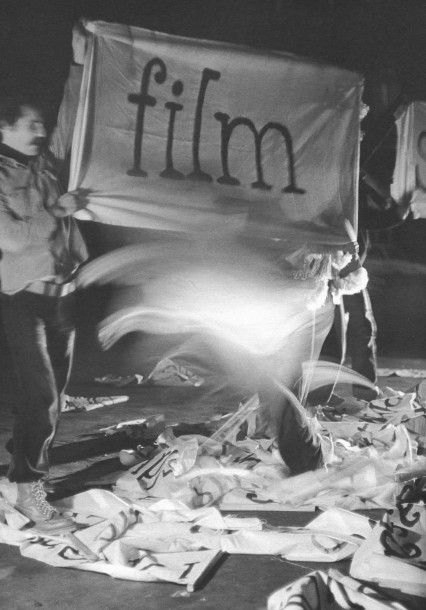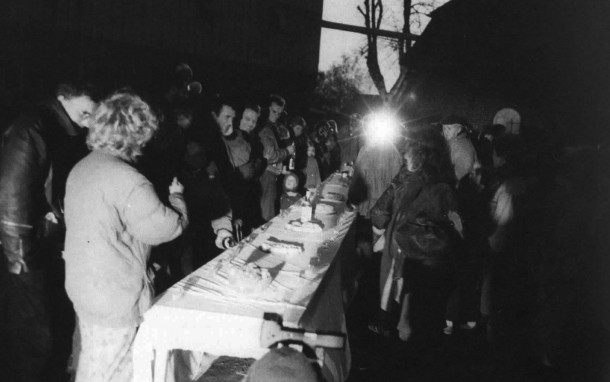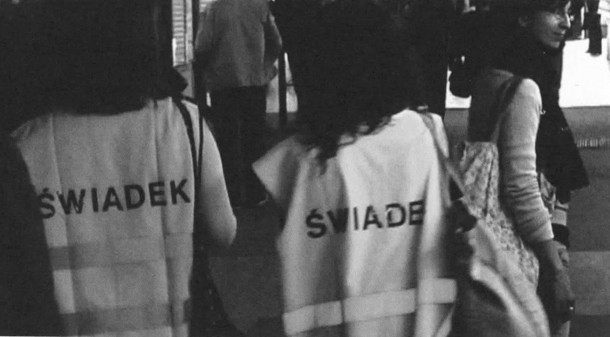The emergence of the artistic approach represented by Akademia Ruchu was related to a process of “theatricalization of the plastic arts” taking place in minimalism. Michael Fried, an advocate of modernism, originally diagnosed and described the process with the intention of repudiating it. Later, however, postmodern critics such as Craig Owens and Hal Foster adopted Fried’s terminology in order to present “theatricality” as an important trend for the development of the visual arts. In their writings, it was the key to understanding the essence of the revaluation of the modernist artistic paradigm and the emergence of postmodern art strategies. These strategies included introducing temporal categories to the visual arts, until then perceived as mainly “spatial.” They were based on dynamic, intermedial crossing of boundaries between artistic disciplines and life, on appreciating the significance of analyzing the process of artistic communication, and on the idea of a conscious artistic strategy rather than unreflective “creative frenzy.”
The Akademia Ruchu artists have been operating at the interface of art and daily life since the 1970s. Rather than striving to equate one with the other (in keeping with the avant-garde’s radical postulates), they study the specificity of their difference. They are interested in the problem of translation, of rendering meaning between the two languages. Testing the language of art and the language of the everyday involves in their case introducing into the field of theatre ordinary gestures, charged with the connotations of their social applications. According to the AR artists, this virtually anthropological process is related to the need for “noticing the value of the interpenetration of art and life.” It is not a question of copying daily life, but in appreciating its often unappreciated meaning, in the structures, rhythms and tensions comprising a model of the activity that fills the space of shared experiences, games, communication, as Wojciech Krukowski explained in 1988 at the ‘Dąbrówka’ Culture Club. For Akademia Ruchu, the simplest gestures often repeated in public space are natural (independent of politics or ideology) mechanisms of self-regulation of social life—its silent binding agent.
Since the very beginning, Akademia’s practice has been marked by a desire to create specific political metaphors. The collective is aware that even what is supposed to be a purely formal gesture is never devoid of an “order of meaning.” Akademia Ruchu strives to gain control, as it were, of the process of the inevitable textualization of its own practice, in an effort to subordinate the creation of formal signs to socio-political commentary. The group’s Urban Actions show that from the 1970s (and especially when compared with the then-dominant apolitical and asocial modernist art), Akademia was one of the first Polish artistic collectives to consistently pursue the trope of the “politicization of aesthetics.” This was, and continues to be, manifest to this day in their creation of unique, aesthetically distinct performative political allegories, firmly rooted in the artistic tradition, referring directly to Poland’s current condition but devoid of any aggressive politicking.
The number of performances and actions carried by Akademia Ruchu in public space so far—about six hundred—is amazing. Whereas many Polish artists have contented themselves with only brief, ephemeral interventions and happenings, AR’s urban actions reflect a consistent and lasting (the only one on this scale) artistic presence in Poland’s public space. The collective urban actions are geared towards discovering ever-new modes of art’s function in society, towards opening ever-new fields of artistic communication. The artistic formula pursued by Akademia is based on confidence in, and respect for, the public, which the artists collaborate with, by opening themselves towards the different ways in which people perceive and describe the world, by initiating forms of behavior that reinforce social bonds and strengthen the community’s self-representation and self-organization, and by building creative social capital, devoid of fear of the Other and outside influence. The collective has developed an artistic formula that is comprehensible for ordinary people, inspires their confidence, and yet adheres to high artistic standards. Akademia Ruchu’s practice strives to overcome the alienation, elitism and, consequently, marginalization of the art discourse, causing its statements to directly influence ordinary people as well as satisfying art professionals’ elevated expectations.
A short history of Akademia Ruchu
Akademia Ruchu was founded by Wojciech Krukowski in Warsaw in 1973. Krukowski remains its artistic director to this day. Other members include Janusz Bałdyga, Jolanta Krukowska Cezary Marczak, Zbigniew Olkiewicz, Jan Pieniążek, Jarosław Żwirblis, and Krzysztof Żwirblis. The group’s practice combines performance with all types of visual expression. They usually perform in public urban spaces, private homes, and industrial spaces. Since 1974 they have created about six hundred performances, street actions, and interventions into the public sphere all over the world. Every action is in a sense a condensed sign that questions social and political practice and provokes the spectator, who as passerby on the street is often thrown unwittingly into the action. One of the most famous performances from the 1970s was The Bus (1975) in which tension was created out of the lack of movement. Later AR created such actions as Europa (Europe, 1976), the famous Kolejki/Sklepy mięsne (Queues/Meat Shops, 1976/77) Dom I (House I, 1978), Dom II (House II, 1978). In 1994 they presented Życie codzienne po Wielkiej Rewolucji Francuskiej (Everyday life after the French Revolution). Dwa Polskie głosy (Two Polish Voices) and an Esej (Essay) that summed up the group’s work during the first decade of the twenty-first century. Akademia Ruchu participated in many major artistic world events such as DOCUMENTA 8 in Kassel, the festival at the Institute of Contemporary Art (ICA) in London, Museum PS1/Clocktower Gallery in New York, NRL Live Art in Glasgow and others. They are scheduled to perform in New York in November 2013. They primarily work and perform in Warsaw.
is an art historian, a critic, and a curator in the Museum of Modern Art in Warsaw. He specializes in the media art, aesthetics, history and theory of film. He is an author of numerous articles and books such as Strategie subwersywne w sztukach medialnych / Subversive Strategies in the Media Arts (2006) and Sztuka polska lat 70. Awangarda / Polish Art of the 1970s. Avant-garde (2009).





